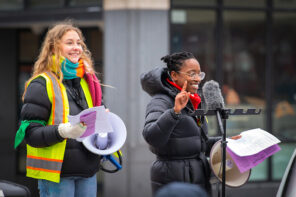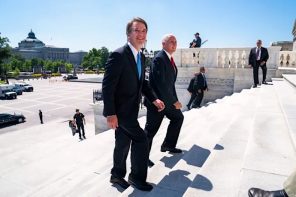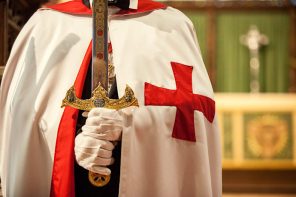One of the strange aspects of broadcaster Glenn Beck’s recent moves to transform himself into a religious leader as well as entertainer and “educator” has been his intense attacks on President Obama’s theology of salvation, which he has called “evil” and “satanic.”
The nature of salvation is not typically the topic of choice for political pundits. But Beck has latched onto it with a fury because he insists that President Obama’s liberation theology-influenced view of salvation is not only unchristian but un-American.
Beck has become utterly enamored of religious right pseudo-historian David Barton, who has not only spent a great deal of time on his program, but also joined him on stage at “America’s Divine Destiny,” the event that kicked off the recent Beckapalooza weekend in Washington DC. It was while watching Divine Destiny that I was struck with what seems like a glaring contradiction. On one hand, Beck and Barton are placing huge political and historical importance on a belief in individual salvation, as opposed to the collective salvation envisioned by liberation theology. But when it comes to worshipping God, religious right leaders insist that individual prayer and praise is not enough; Americans have what you might call a collective duty, as a nation, to acknowledge our dependence on God.
At one level, you could view Beck and Barton’s attacks on liberation theology and collective salvation as part of a century-long debate in this country between a personal gospel and a social gospel; it’s part of the history of Christianity in America. But there’s more at work here. In Beck’s and Barton’s hands, the attack on collective salvation becomes a cultural weapon against adherents to the social gospel as well as a political weapon against the constitutional principle of church-state separation, the bedrock of individual religious liberty.
I’m not going to evaluate Beck’s interpretation of liberation theology here. (For a thoughtful response to Beck’s interpretation of liberation theology, see RD’s interview with scholar Serene Jones by Elijah Prewitt-Davis.) But it is clear that Beck is dismissing the faith of millions when he creates a simplistic label—‘individual’ or ‘collective’—and declares the latter to be un-Christian. For many Christians, says J. Brent Walker of the Baptist Joint Committee, it’s a both/and, an individual decision nurtured by a church community. Max Carter, a Friends minister (and, like Walker, a commenter on a recent Washington Post On Faith question about whether Obama’s faith matters), says this:
I hesitate to criticize Beck’s faith, but his belief that Christianity is about “individual salvation” is actually counter to the faith of millions of Christians who see the church as the “ark of salvation” and that “personal salvation” is itself a perversion of the Christianity of Acts 2 and the earliest years of Christianity. Ask any Amish person.
To Beck and Barton, the question of President Obama’s beliefs about salvation is not only a theological dividing line between good and evil, but also legitimate political fodder because they say it is a source of his collectivist, even Marxist, worldview. And it demonstrates his lack of commitment to the “quintessential American concept” of individual rights.
Barton’s theory boils down to this: if it weren’t for revolution-supporting preachers and their doctrine of individual salvation, individual rights would not have been incorporated into our founding documents. If it weren’t for those preachers, he says, America today would be more like France, following the European model of “collective rights, collective issues, collective everything.”
In the Tea Party era, ‘collective’ is a four-letter word. Beck and Barton don’t even like the terms “human rights” or “social justice” because they see them as collectivist. In a televised conversation in April, Barton dismissed social justice, saying “That’s collective rights. Jesus was not into collective rights. He didn’t die for world in large. He died for every single individual.” Beck is spending so much time on collective salvation because he wants people to believe it is behind all the nefarious things he wants them to fear:
Get into your church and demand, demand that your minister, your priest, your rabbi, your pastor talk about individual rights. If they don’t know them, tell them to pick up George Whitefield. Tell them to pick up the sermons. They are available online. They are available in bookstores everywhere. The sermons that led to the American Revolution, on individual rights. Please, I beg of you. These people will take over the Internet. These people will destroy talk radio. These people will take Fox News off.
But that commitment to individual liberty, and hostility to the collective, seem to disappear with the insistence that it is not only individuals but America as a nation that must “turn back to God.” Where does that leave Americans who don’t see their faith through a prism of American nationalism? Not to mention the growing number of Americans without any religious commitment?
Beck tells us, “you must fall to your knees and you must reconnect with God. He is not asking you. He is commanding us as a people to get behind Him. He will right the wrongs. We will have to pay a price because we lived outside of His laws. We will have to pay a price, but every day we don’t get behind Him, the price gets bigger. It gets harder. Get behind Him. He will be our shield because these people are not enemies of ours. They are enemies of Him. They are enemies of man’s freedom.”
“Commanding us as a people.” Doesn’t that sound dangerously collective?
Brent Walker, a longtime advocate for religious liberty, agrees that there’s a dichotomy. Walker is careful to draw a line between what he sees as appropriate public evangelism, like Beck’s rally, and getting the government involved. “Where I see the contradiction is advocating for religious liberty and trying to co-opt the government to do your bidding.”
Which brings us back to America’s Divine Destiny, the Friday night event at the Kennedy Center. One of the speakers, Professor Patrick Lee of Franciscan University in Steubenville, Ohio, insisted that we “owe to God thanks and reverence for his many blessings” and said “this is true not only of us as individuals but us as a community, us as a country.” This was just after Beck and Barton were hyping the important of individual salvation and individual Liberty. Because God has shed his grace on America, Lee said, “we have a solemn duty as a community to thank God publicly for his many blessings.”
Lee called for the return of the prayer that was the focus of Engel v. Vitale, the landmark 1962 Supreme Court case on church-state separation: “Almighty God, we acknowledge our dependence on thee and we beg Thy blessings on us, our parents, our teachers, and our country.” Alveda King, a speaker at Renewing Honor, also sounded this theme, saying a return of school prayer would be one indication that the nation had indeed restored its honor.
The prayer Lee cited had been composed by New York state officials to be read in public school classrooms at the start of the school day. Lee said the prayer “is not an establishment of any particular religion, but an acknowledgment of a truth, and a debt we owe God.” The Supreme Court, with only a single dissenting vote, disagreed. The Court’s decision appealed to the same founders that Beck and Barton are claiming as their inspiration.
It has been argued that to apply the Constitution in such a way as to prohibit state laws respecting an establishment of religious services in public schools is to indicate a hostility toward religion or toward prayer. Nothing, of course, could be more wrong. The history of man is inseparable from the history of religion. And perhaps it is not too much to say that, since the beginning of that history, many people have devoutly believed that “More things are wrought by prayer than this world dreams of.” It was doubtless largely due to men who believed this that there grew up a sentiment that caused men to leave the cross-currents of officially established state religions and religious persecution in Europe and come to this country filled with the hope that they could find a place in which they could pray when they pleased to the God of their faith in the language they chose.
Amen.




